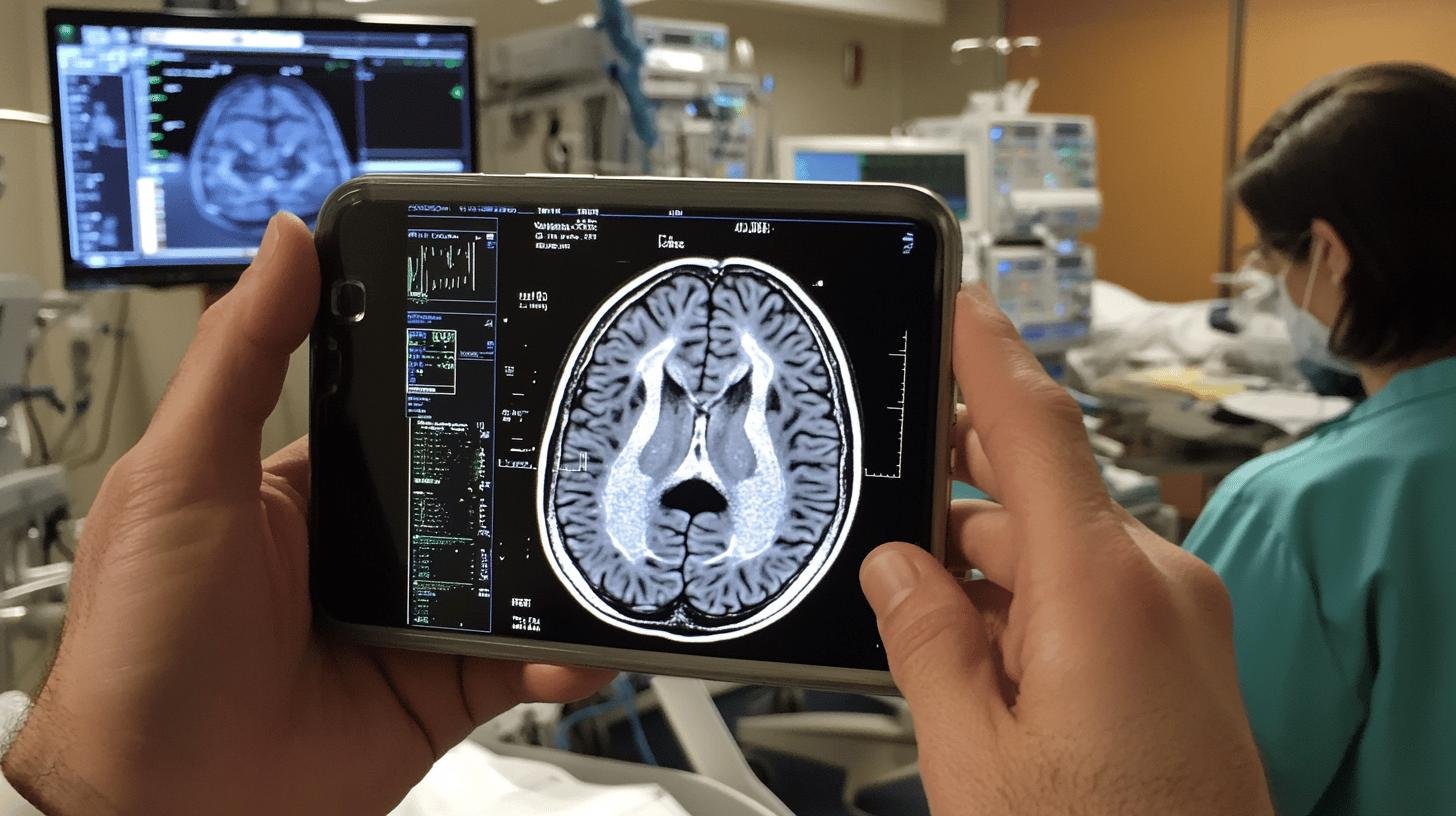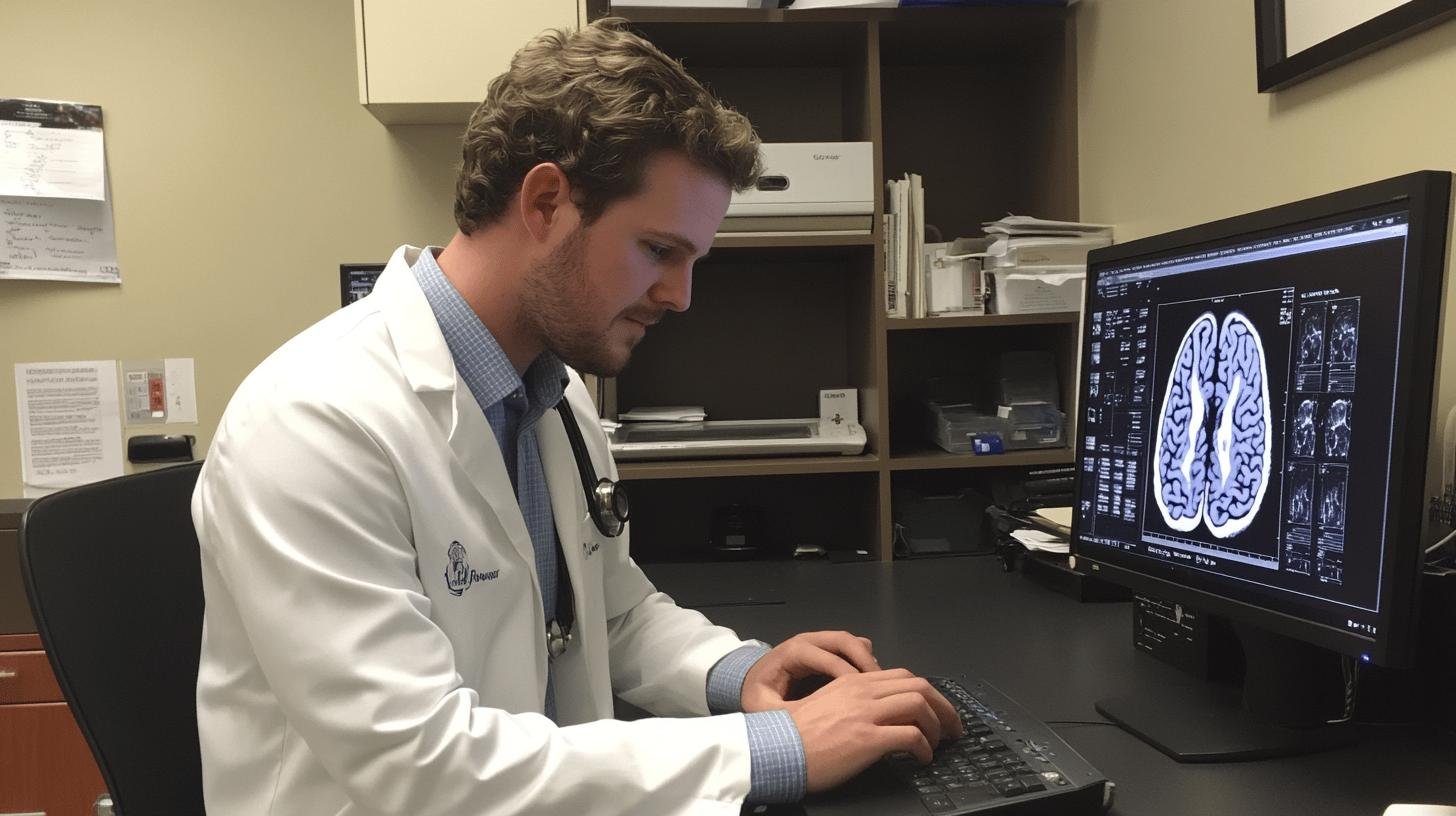TL;DR:
- Neurological diseases like ALS, Parkinson’s, and stroke disrupt speech through muscle coordination and brain function.
- Parkinson’s Disease: Soft, monotone voice due to muscle rigidity.
- Huntington’s Disease: Causes slurred speech and poor articulation.
- ALS: Weakens muscles, leading to slow, laboured speech.
- Multiple Sclerosis: Results in unclear, slurred speech.
- Stroke: may cause aphasia and dysarthria, affecting language and speech clarity.
- Diagnosis involves neurological exams, scans, and speech assessments.
- Treatments include speech therapy, medications, assistive devices, and sometimes surgery.
- Direct primary care enhances accessibility and personalizes treatment for speech disorders.
Neurological diseases that affect speech can cause you to struggle to express a simple idea because your brain and mouth just won’t sync up. Neurological diseases can hijack our speech in the blink of an eye, making conversations feel like hurdle races when they should be a walk in the park. From ALS to Parkinson’s disease, these brain disorders hit our speech capabilities hard, affecting how we communicate. In this article, we’ll unravel the mystery of how these diseases impact speech and why understanding them is crucial for taking back control. Let’s dig in and see how we can make talking painless again!
Understanding Neurological Diseases That Affect Speech
Speech often suffers when neurological diseases like ALS, Parkinson’s, and stroke emerge. These conditions disrupt muscle coordination and brain function, impacting communication.
How do these disorders affect speech? They hinder the brain’s control over the muscles we use for talking. For instance, aphasia, common after a stroke, affects language comprehension and production. ALS weakens muscles, causing slurred speech. Parkinson’s disease might lead to a soft and monotone voice due to muscle stiffness. Every condition uniquely affects speech.
Understanding these impacts is crucial for effective management. Doctors can craft better treatment plans with this knowledge, ensuring patients receive appropriate care and maintain smoother communication.
Major Neurological Disorders and Their Speech Effects

Neurological disorders can significantly disrupt speech. Each condition affects speaking in distinct ways, requiring specific attention. Here’s how some major conditions impact communication.
Parkinson’s Disease
Parkinson’s disease acts like a thief, gradually stealing vocal strength. Muscle rigidity is the main issue, leading to softer, monotone speech. Vocal cords lose the range of movement, making it hard to express oneself audibly.
Huntington’s Disease
Huntington’s disease causes slurred speech due to muscle control problems. As the condition advances, coordination deteriorates, complicating word articulation. It’s akin to speaking with a mouth full of marbles.
Amyotrophic Lateral Sclerosis (ALS)
ALS weakens nerve cells controlling muscles, making speech production difficult. Like sidelined athletes, muscles lead to slower, laboured speech, and even breathing can be impacted. Creative communication solutions are necessary.
Multiple Sclerosis (MS)
MS disrupts communication between the brain and body, leading to unclear speech. Imagine a bad phone connection—that’s what MS does to messages from the brain to speech muscles, causing slurred or slow speech.
Speech Impairment in Stroke and Traumatic Brain Injury
Speech problems often follow strokes or traumatic brain injuries (TBI), affecting many survivors. Recovery can be challenging, but understanding these effects helps.
Strokes often cause aphasia, affecting language comprehension and production. Broca’s aphasia impacts sentence formation, while Wernicke’s complicates understanding. Strokes can also lead to dysarthria, where weakened speech muscles cause slurred communication.
TBI affects speech by impairing muscle control and language processing. This leads to slurred speech and difficulties in finding or ordering words.
- Language comprehension difficulties
- Slurred speech
- Muscle control issues
- Difficulty forming words
- Reduced speech volume
Rehabilitation is essential for recovery. Speech therapy targets muscle strength and language processing, offering hope with the right support and effort.
Diagnostic and Treatment Approaches for Neurological Speech Disorders

Diagnosing how neurological issues affect speech involves thorough exams, including neurological tests, MRI or CT scans, and speech assessments. These help uncover root problems, enabling effective management.
Speech therapy plays a crucial role, working as a gym for vocal cords and the brain. Tailored exercises strengthen muscles and improve brain signals. This approach adapts to individual needs, whether addressing slurred speech from a stroke or word-finding difficulties with Parkinson’s.
Additional treatments include medications to manage symptoms like muscle rigidity and assistive devices for regaining a voice. Surgery, such as deep brain stimulation, is an option for severe cases. Combining treatments can greatly enhance communication.
| Diagnostic Method | Treatment |
|——————————-|———————————-|
| Neurological Examination | Speech Therapy |
| MRI or CT Scans | Medications |
| Speech Evaluations | Surgical Interventions |
| Auditory Processing Tests | Assistive Devices |
| Cognitive Assessments | Behavioral Therapy |
Role of Direct Primary Care in Managing Speech Disorders
Direct primary care offers personalized, affordable healthcare without insurance barriers. It makes speech therapy for neurological disorders more accessible. Patients get direct access to providers, avoiding long waits to discuss speech goals.
Continuous communication with healthcare providers keeps treatment plans dynamic and responsive to progress. This flexible approach ensures updated, effective care. Regular interactions help doctors identify issues early, enhancing the management of speech disorders—direct primary care functions as a supportive healthcare partner, always ready to help.
Final Words
Understanding neurological diseases that affect speech is crucial for managing communication challenges. We’ve looked at how conditions like Parkinson’s and ALS mess with muscle control, causing speech changes.
Stroke and traumatic brain injuries often lead to aphasia and other speech troubles, but rehab offers hope.
Direct primary care steps in with personalized plans and constant communication, making managing these issues more accessible.
By grasping these impacts, we can improve diagnosis and treatment, leading to better outcomes for those affected. It’s a journey of understanding but one with promising possibilities!
FAQ
What neurological disorders cause speech issues?
Neurological disorders like ALS, Parkinson’s, Multiple Sclerosis, and stroke can impact speech. They affect muscle coordination or brain function, leading to speech clarity and volume changes.
What neurodegenerative disease affects speech?
Amyotrophic Lateral Sclerosis (ALS) affects speech by weakening the muscles controlling speech and breathing, causing difficulties over time.
What are the symptoms of sudden speech problems in adults?
Sudden speech problems in adults can include slurred speech, difficulty forming words, changes in speech volume, and issues with language comprehension.
What is dysarthria?
Dysarthria is a condition where weakened or damaged speech muscles lead to slurred or slow speech, affecting clear communication.
What are four symptoms of a neurological brain disorder?
Common symptoms are language comprehension difficulties, slurred speech, muscle control issues, and reduced speech volume.
What causes sudden slurred speech in the elderly?
In the elderly, sudden slurred speech might be due to stroke, a transient ischemic attack (TIA), or other neurological changes needing prompt medical evaluation.
What neurological disorder makes speaking impossible?
Aphasia can sometimes result from brain injuries or stroke, affecting language production and comprehension, sometimes severely.

